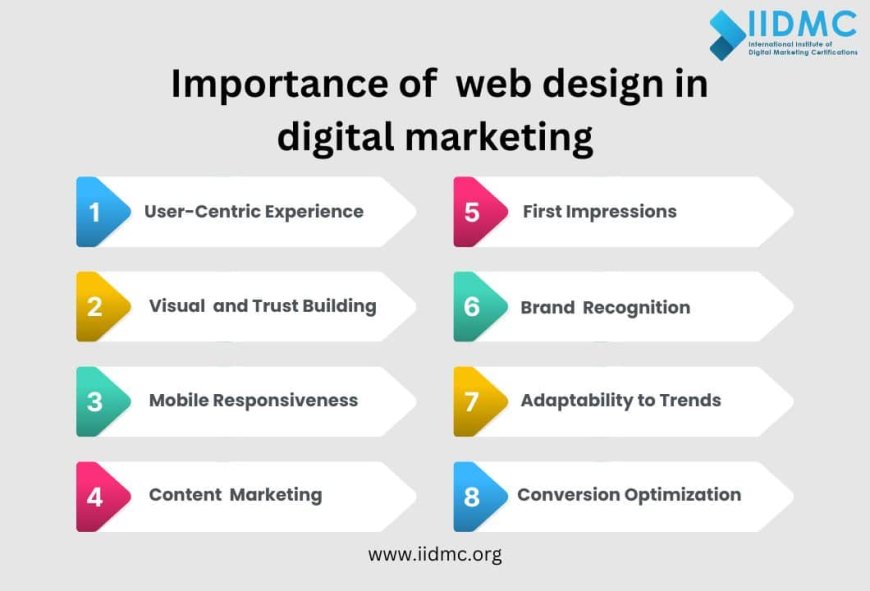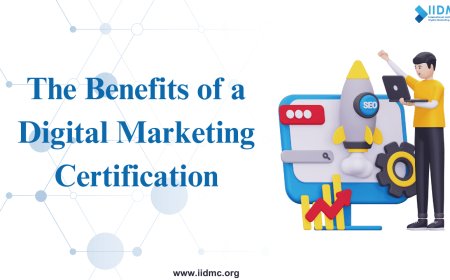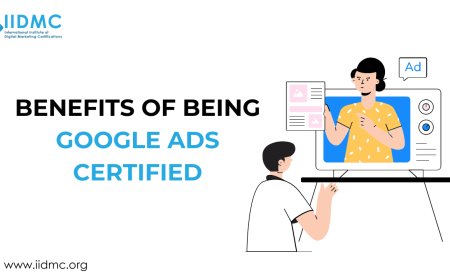Importance of Web Design in Digital Marketing Career
Explore the importance of web design in your digital marketing career. Learn how it impacts your success and enhances online effectiveness.

Web design is a cornerstone of digital marketing, crucial for shaping user experience, enhancing brand perception, and boosting online visibility. A well-crafted website not only captivates visitors with its visual appeal but also ensures seamless navigation and accessibility across devices. By prioritizing responsive design, fast loading times, and intuitive layouts, businesses can optimize their online presence to attract and engage audiences effectively. In today's competitive landscape, investing in strategic web design is essential for staying ahead in the digital marketing arena.
Web Design in Digital Marketing refers to the strategic and aesthetic creation of online interfaces that enhance user experience and contribute to overall marketing success. As the digital landscape evolves, there is a growing demand for skilled professionals who can seamlessly integrate web design into comprehensive digital marketing strategies. Businesses recognize the pivotal role of visually appealing and user-friendly websites in capturing audience attention, fostering engagement, and ultimately driving conversions.
Web Design skills in digital marketing
-
User-Centric Design: Web designing skills in digital marketing involve creating user-centric interfaces that prioritize a seamless and intuitive experience for visitors.
-
Visual Appeal and Branding: Proficiency in design tools enables digital marketers to craft visually appealing websites, ensuring consistency in branding elements for heightened recognition.
-
Responsive Design: Knowledge of responsive design principles is crucial for optimizing websites across various devices, accommodating the diverse preferences of the online audience.
-
SEO Integration: Web design in digital marketing must understand and implement SEO-friendly practices to enhance search engine visibility and attract organic traffic to the website.
-
Adaptability to Trends: Staying current with evolving design trends is essential, allowing digital marketers to create contemporary and engaging online experiences that resonate with the target audience.
-
Effective Communication: Strong web designing skills empower digital marketers to convey their messaging effectively through compelling visuals, contributing to the overall success of online marketing campaigns.
Challenges faced by digital marketers without web design knowledge
Limited Control Over Online Presence: Digital marketers without web design knowledge may face challenges in shaping and controlling the visual representation of their brand online. This lack of control can result in a disjointed or inconsistent brand image across various digital platforms.
Ineffective User Experience (UX): Without an understanding of web design principles, marketers may struggle to create user-friendly websites. This can lead to poor navigation, slow loading times, and a suboptimal overall user experience, negatively impacting engagement and conversion rates.
Dependency on External Resources: Marketers lacking web design skills might need to rely heavily on external designers or developers for website updates and modifications. This dependence can lead to delays in implementing marketing strategies and responding to rapidly changing market dynamics.
Challenges in SEO Optimization: Web design and digital marketing are closely intertwined. Without knowledge of web design, marketers may struggle to implement SEO best practices, affecting the website's search engine rankings and visibility.
Inability to Adapt to Trends: Digital marketing is dynamic, and trends in web design evolve rapidly. Marketers without web design knowledge may find it challenging to adapt their online presence to current design trends, potentially making their brand appear outdated.
Difficulty in Integrating Multimedia: Incorporating multimedia elements, such as videos and interactive content, is crucial in modern digital marketing. Without web design skills, marketers may find it difficult to seamlessly integrate these elements into their online campaigns, limiting the overall effectiveness of their strategies.
Why is web design important for success in digital marketing?
Web design is crucial for success in digital marketing for several reasons

1. User-Centric Experience: Effective web design and digital marketing revolves around creating a user-centric experience. By understanding the needs and behaviours of the target audience, designers can structure websites to facilitate easy navigation, making it intuitive for users to find information or complete desired actions. This positive user experience is crucial for keeping visitors engaged and encouraging repeat interactions.
2. Visual Appeal and Trust Building: A well-designed website contributes significantly to forming a positive first impression. The visual aesthetics of a site, including layout, colour schemes, and graphics, play a vital role in establishing a sense of professionalism and trustworthiness. Users are more likely to engage with and trust a brand that presents itself well visually.
3. Mobile Responsiveness and SEO: The increasing use of mobile devices emphasizes the importance of responsive web design. Mobile-friendly websites not only cater to a broader audience but also align with search engine preferences. Search engines prioritize mobile-friendly content in their rankings, making responsive design a critical factor for search engine optimization and improved online visibility.
4. Brand Consistency and Recognition: Web design allows businesses to maintain consistent branding across various online platforms. From the website to social media profiles, consistent use of brand elements reinforces brand identity and aids in brand recognition. A unified and recognizable brand presence fosters trust and loyalty among users.
5. Adaptability to Design Trends: Web design in digital marketing is a dynamic field that evolves with design trends and technological advancements. Staying current with these trends is essential for keeping a website visually appealing and aligned with contemporary expectations. A modern and visually pleasing website reflects a brand's commitment to staying relevant and engaging with its audience.
6. Conversion Optimization: A well-designed website considers user psychology and incorporates elements aimed at optimizing conversions. Strategic placement of calls-to-action, clear navigation paths, and enticing visuals all contribute to guiding users toward desired actions, such as making a purchase or filling out a form. This focus on conversion optimization directly impacts the overall success of digital marketing campaigns.
The relationship between web design and digital marketing is undeniable in today's competition. A well-crafted website is the linchpin for successful digital marketing campaigns, serving as the platform where user experience, branding, mobile responsiveness, and SEO optimization converge. Digital marketers equipped with strong web design skills navigate the challenges seamlessly, leveraging the power of effective communication through visuals, adaptation to trends, and optimized multimedia integration. Conversely, those lacking web design knowledge face hurdles in maintaining brand consistency, providing an optimal user experience, and staying abreast of evolving industry trends. Recognizing the critical role of web design is imperative for digital marketing professionals, as it directly influences the success and efficacy of their online strategies, making it a fundamental pillar in digital marketing.





























